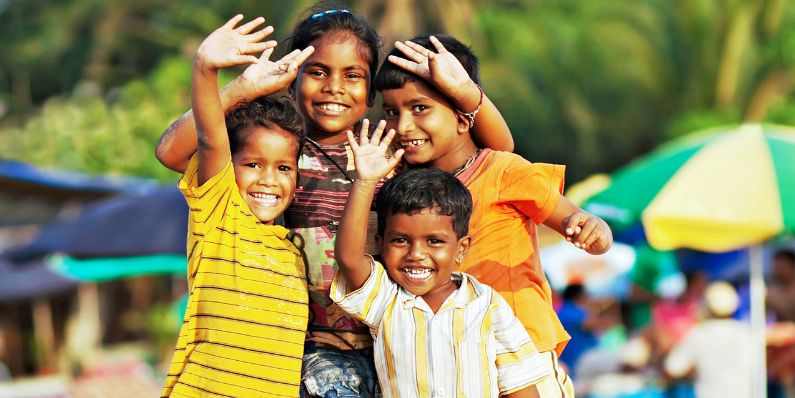
Withering Childhood?
The contrast between how good childhood could be and how bad it is for many, has never been greater in human history.
Today is World Children’s Day.
In times when some are dreaming of colonising the Moon and Mars, and when there are more billionaires in the world than ever, and when optimist futurologists are telling us fairy tales of machines making life a haven for humans - some 333 million children live in extreme poverty and over one billion are multidimensionally poor, meaning they lack one or more of the basic necessities of life. These are hard numbers and not restricted to so-called developing economies. Some 16 million children live in poverty in the US and the UK.
Many among these also suffer mental health issues; so do a large number who are not in these poverty numbers. Almost 22% of children in the US suffer from mental health issues. Worldwide some 10%-20% have mental illnesses; and the proportion goes above 30% in Pakistan. It seems that we fail to realise that without children, we will lose the collective meaning of life – the point of tomorrow. In a world of abundance, both in wealth and dreams, how can we ensure that the well-being of every child is prioritised, transcending geographic and economic boundaries?
Lest we forget, a multitude among those who are apparently not in any of the above categories, still suffer trauma, abuse and neglect. Often, while material comforts are available, the time needed to provide the sense of security and unconditional love is absent. In fact, children with material comforts are targeted by companies as potential lifelong consumers or producers. A huge number of children spend more time using screens than spending time with their close family members or with friends in communal spaces. States and religious institutions see children as loyalists who must be indoctrinated from the cradle. I shudder to even refer to Gaza whose children are bearing the brunt of astonishing indifference from those who can do something to alleviate suffering.
Bounded in the skull, the infant’s brain strives to make sense of the world around it through the sensory data it receives from the developing organs of sense perception. It is from the touch of comfort or the agony of abuse, from the words of love or screams of abuse, from the glances of praise or looks of disdain that the brain builds up its judgement about the world – settling on whether it is a place of comfort and peace or one of anguish and war. These hard-wired impressions of childhood provide the framework for how the child sees the Other, anticipates the future and relates with the environment. The experiences of childhood become the ‘straightjackets’ of adulthood. Can we collectively contribute to creating environments where the sensory experiences of childhood foster positive judgments, empathy, and resilience, breaking the cycle of straightjackets in adulthood?
Where do we go from here?
- To begin with, let us recognise that children are suffering. It will be hard to find a more difficult time to experience the innocence, joys and intelligence of childhood. We must sympathise with the child and adolescent of today.
- This recognition, if sincere, will itself prompt our imagination to do what we can in our own contexts. This is how the mind works – when it feels guilt, it seeks atonement.
- We must recognise childhood as a distinct phase of life and not as a stage of mini adult who must be moulded into a loyal citizen or a believer or a consumer or a technician or a warrior or adept at passing exams. Protect your child from such predators of the mind.
- Let the child’s mind unfold its potential on its own terms; trust that this seed has an oak or an apple or some other yet unknown fruit in it that will emerge under the apricity of kindness and trust.
- Understand that the ingredients of a happy childhood are time, love, safety and basic biological needs. It is one of the great acts of justices that these can be provided by all, regardless of the status of income and wealth. In fact, an oft made mistake is to think that these can be replaced by luxuries and gadgets.
- Don’t fall for the idea that a little quality time is all that is needed. The child cannot define quality in abstract terms. For the child, quantity is quality.
- Child abuse – physical as well as vicarious through images – must get our highest opprobrium and must be made an irredeemable taboo.
- Encourage children to think critically, ask questions, and reflect on various topics. Integrate open-ended discussions and activities that stimulate their curiosity and foster critical thinking.
- Encourage parents and caregivers to create an environment that nurtures curiosity, values diverse perspectives, and promotes continuous learning. This can be achieved through discussions, reading together, and exploring the world outside the home and classroom.
Let me end with words from Khalil Gibran’s thoughts on Children from his poem The Prophet:
You may strive to be like them, but seek not to make them like you.
For life goes not backward nor tarries with yesterday.
You are the bows from which your children as living arrows are sent forth.
The archer sees the mark upon the path of the infinite, and He bends you with His might that His arrows may go swift and far.
Let your bending in the archer’s hand be for gladness;
For even as He loves the arrow that flies, so He loves also the bow that is stable.
Dr Farid Panjwani
Professor and Dean, AKU-IED
November 20, 2023


